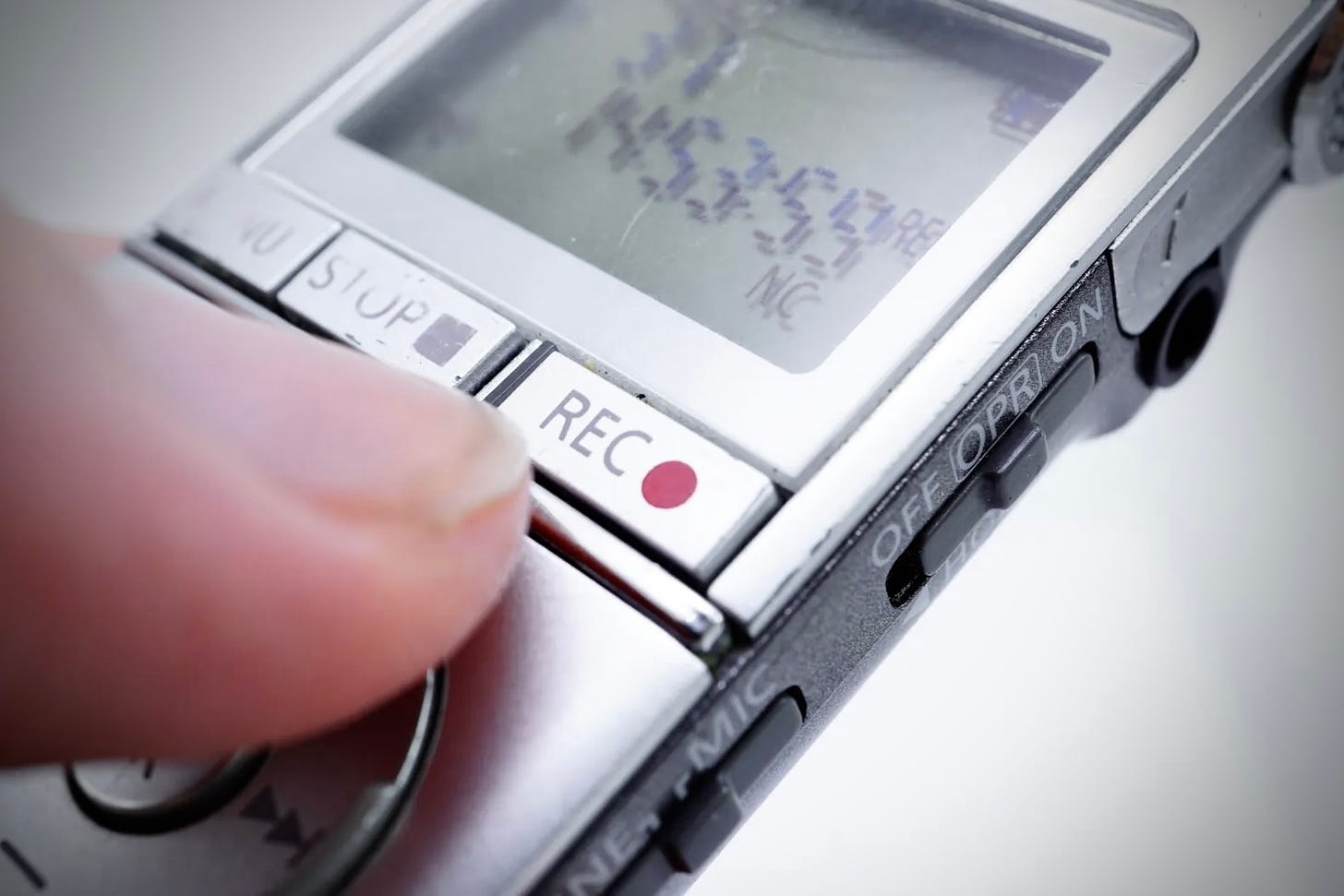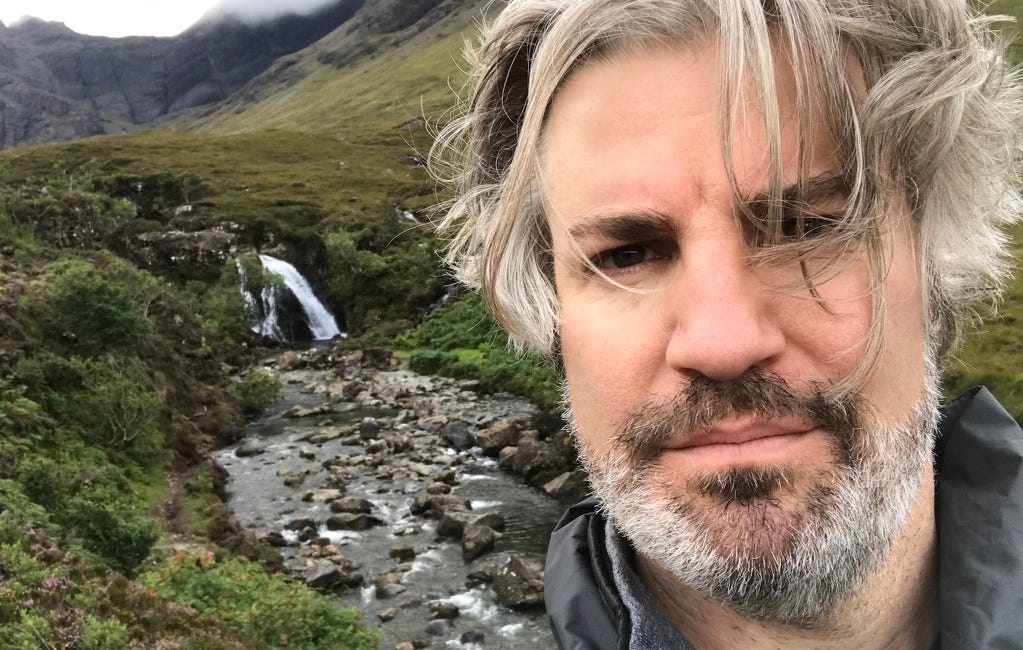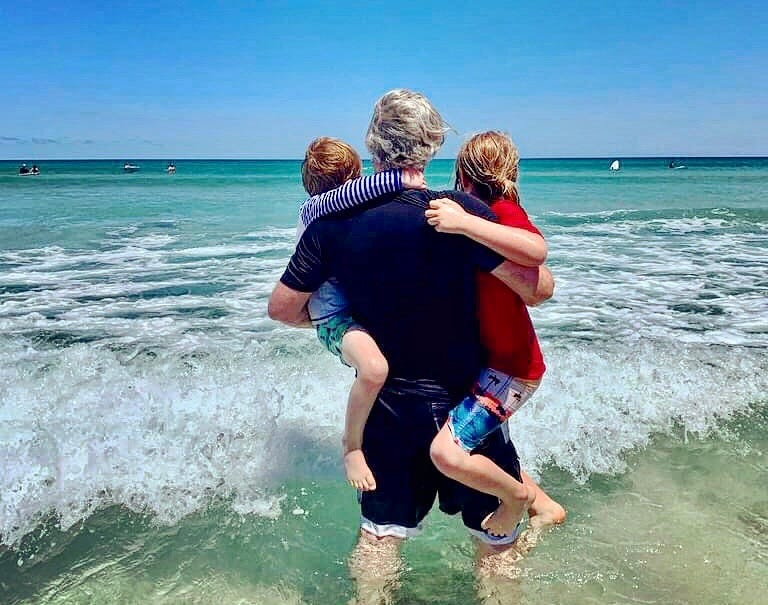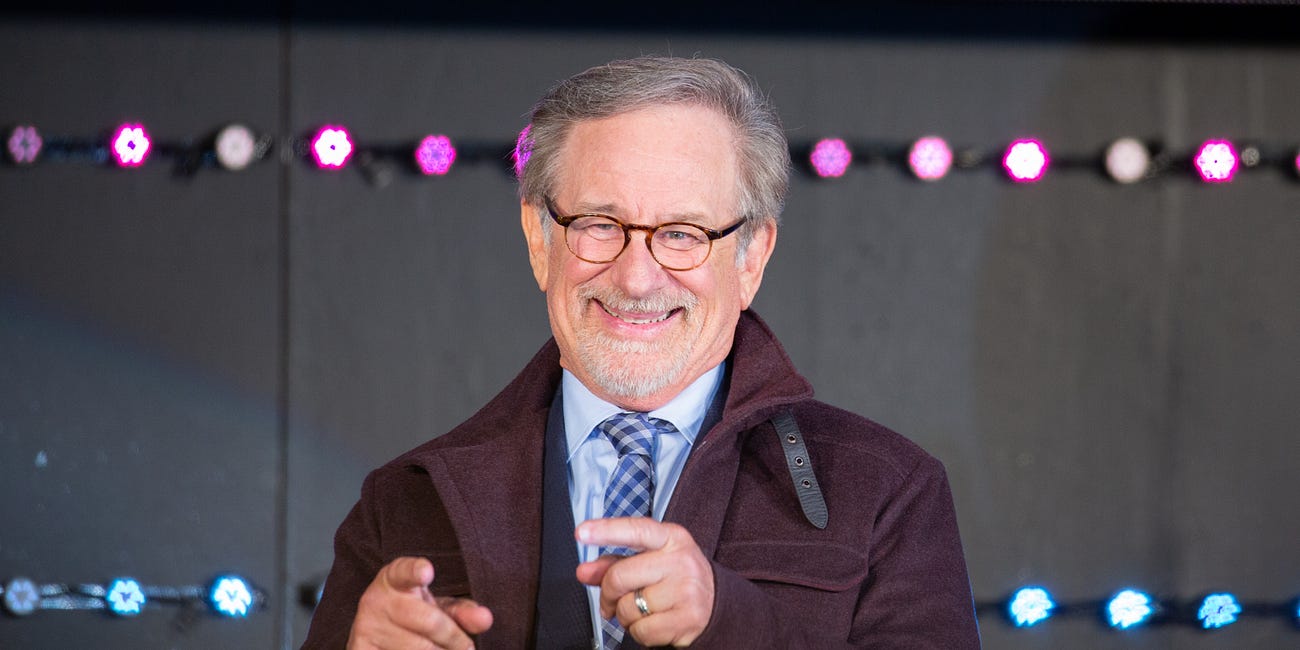How to Write Better Dialogue (While Becoming a Better Person)
Let's discuss what you can learn from interviewing others - both to enrich your writing and your life
My father and mother had been divorced for a decade when she died. After her funeral, he was soft-spoken and present in a way I hadn’t seen him for many years, if not ever. As it turned out, he was the absolutely perfect parent to have around when your heart is broken; he’d lived through so much grief of his own at that point, I think he just understood how to be quiet and let the one in pain set the tone.
I dropped into the seat across from him at the kitchen table, tired and broken in a way I’d never experienced before, and, when he asked me if he could do anything for me, I set my cell phone on the table in front of him, tapped record, and said, “Yeah, Dad, you can tell me how you met my mother.”
More than a decade earlier, I found myself sitting in a camper trailer with actress Juliette Lewis who, at the time, was the frontperson of the rock band Juliette and the Licks. This was my very first in-person interview as a freelance arts journalist. I’m an anxious person, I’ve come to accept, and I’d spent several days nervous about this conversation. I didn’t want to make a fool of myself.
Juliette was generous and unbelievably forthcoming, though, in hindsight, it’s obvious that had more to do with where she was in her life than me. But what she did by making me feel as if I knew what I was doing was teach me how to do my job. A few short interviews later, I’d worked out that what artists – what everyone, really – want is to be listened to, to be understood, to be seen. It’s something I remember every time I start one of my artist-on-artist conversations for 5AM StoryTalk. I don’t arrive with an agenda except to find out who the person I’m talking to really is as an artist and, if I’m lucky, maybe even as a person.
I’m going to explain why I think this is a skill artists of all varieties need to foster in themselves, as well as share with you some of the tools I’ve developed to do this. Eventually, I’ll explain what happened with my father on the night of my mother’s funeral.
There are three reasons why I think you should experiment with interviewing people yourself, even as a personal practice the same way that you might journal or sketch while sitting at a café.
1. It develops a different kind of empathy than most of us are used to exercising
Interviewing people about themselves isn’t quite like grabbing a drink with a stranger at the bar, though I find I tend to do both in very similar ways these days because I have a deep interest in people’s stories. If you’re doing it right, you’re largely removing yourself – and your ego – from the equation. You become a facilitator of someone else’s truth, both the version they want to present and the less guarded one you must carefully extract from them. This exchange is so unevenly weighted toward their emotional needs that you inevitably leave yourself open to a visceral vicarious experience. Of course, journalism tends to work in a more detached way, but, frankly, I was always a shit journalist. I’m not one now either, in my mind. I’m a professional artist who interviews other artists because I am passionate about art, not because I want to prize scoops from people. Hell, one of the rules of my interviews is I don’t do scoops or clickbait. My only goal is to see an artist for who they really are, but also to help them feel seen because I know how rare it is that artists truly feel that way. I have a collection of emails from the subjects of my conversation series that attest to how successful I am at this, which I wholly attribute, again, to the removal of my ego – as much as that’s possible – from the equation.
Developing this kind of empathy helps you to better understand the identities people present to the world and why they want you to see them that way, but also how these identities help obfuscate deeper truths about themselves that maybe they don’t consciously want you to see or even have forgotten themselves. On several occasions now, I’ve been told I led an artist to an epiphany about their life or work. A few people have now told me our conversations made them cry, leaving me feeling like Robin Williams holding his arms out to Matt Damon in Good Will Hunting.
What I’m describing here are the complex and multi-layered – sometimes even contradictory – identities we develop and create over the years of our lives for any number of reasons. (I recently described my own in this tale of my secret origins as a professional writer: “Portrait of an Artist as a Young Liar”.) As I’ve developed my ability to better perceive the selves we’ve each essentially constructed from genetics, childhoods, traumas and triumphs, and a whole lot more life experience, I believe I’ve become a better, even more intuitive artist.
2. It helps you understand how people speak
There was a period of three or so years around thirty years old where I had to transcribe an average of six hours of interviews a week. Other journalists I knew used professional services, but I wasn’t making enough to waste money on that. So, I did it myself. Press play on my portable tape recorder. Scribble out what someone said. Pause. Maybe rewind. Do it again. Over and over, for hours. Filling up notebooks, then transcribing what I’d written into Word. Precision felt sacred to me, as these were people’s voices after all.
The artists I interviewed were from across the United States, but also originated from elsewhere around the globe. As I transcribed my interviews with them, I began to discern how differently each of them used English. On some occasions, they weren’t native English speakers, which introduced a whole other level of complexity to how they expressed themselves. Regional differences became painfully obvious to me. I began to identify where people were from based on previous interviews with others. People used humor differently based on their class backgrounds, they advertised their education or lack thereof in distinct ways, they concealed who they really were in a variety of ways. I know I’ve said people all want to really be seen, but I’ve come to believe most people will simultaneously do whatever they can to make sure they’re not. Language is a vital part of this.
In conducting all these transcriptions, I also began to evaluate how language was transmitted within my own family. We learn how to think about the world from our families, such as our parents, grandparents, aunts and uncles, and more. But within those families, sub-communities also form. You and your siblings develop your own secret language, for example. Years later, you still use it for a laugh.
Since I transitioned from a career as an arts journalist to screenwriting and now fiction writing, I’ve read a lot of scripts and manuscripts over the years from aspiring and emerging writers. There’s a lot of focus such writers put on rules or form or things that I don’t think really impact whether a script or book is readable. What does, at least for me, is an understanding of how people speak to each other, what they say, what they don’t say, what they’re really saying when they do either. In fiction, it’s often how we express the interior lives of these characters, which follow similar rules, I find. There’s what we’re thinking, what we’re trying to avoid thinking, and what we’re trying to convince ourselves about the previous two. In all these cases, this is how characters move through their lives/stories, how they drive the story/plot, which means if they’re written in some way that defies how humans actually use language to communicate and understand themselves, then I stop reading.
Don’t get me wrong, I’ve written a lot of bad dialogue in my life. No writer hasn’t, from my experience. But there’s a huge difference between writing a bad line or even a bad exchange of dialogue and writing an entire script or book that seems disconnected from how the rest of us speak and make sense of this world. One of the most galling aspects of how my “Dracula” pilot was rewritten was how little effort was put into synthesizing my language and the head writer’s much more overtly theatrical, unrealistic use of it. When my friends and family sat around on premiere night, people shouted, “Cole! Not Cole!” at the screen, trying – and almost always accurately – guessing what dialogue I’d written and which I hadn’t. Unfortunately, the “Not Cole!” dialogue will forever be associated with me - which I will forever be embarrassed by.
3. It makes you feel less alone
This last point has nothing to do with what interviewing other people can teach you about writing or how to create better, truer art, or anything like that. At the end of the day, the act is one of submission to other human beings. In that submission, in asking and helping them to reveal themselves to you in some way they otherwise would not have – or might’ve even been afraid to – you become a servant. And while ideas like submission and servitude as ways to enlightenment or even grace can sound ickily like justification for all forms of abuse, in this case I do believe this act creates connections to others that make the world feel less cold and alien than it already does. In my case, I can confidently say they’ve helped make me a better human being.
Returning to where this conversation began…my father struggled with facts when he talked about his past. I think the truth was hard for him to reckon with; there was so much trauma behind him, especially when it came to the years surrounding his tours in Vietnam, that it muddied how he remembered things. A little self-editing was his preferred solution. This tendency toward what we can call exaggeration made him a great storyteller and quite popular at a barbecue, even though I think his closest friends came to regard his yarns with as much skepticism as I did.
After my mother’s funeral, when I asked him to tell me how he met her, I expected his answer to be typically self-aggrandizing and maybe even colored by the hurt my mother caused him when she (quite rightfully) divorced him. I would have to coax bits of facts out of him, patiently and methodically, and then reassemble those into something like the truth later.
But something happened when I pressed record.
My father’s whole posture changed. Suddenly, he was the subject of an Errol Morris documentary. This wasn’t the bar, where he could spin one of his tales over beers. What he was being asked would be on the record forever, he knew. I would hold onto what he was about to say forever.
For the next 45 minutes, my father spoke with almost no interruptions. I asked a dozen or so questions, but otherwise, I just let him talk, inviting more out of him when necessary. And as he did, his face changed, lighting up with memories it seemed he hadn’t accessed for years. The details were so precise that I recognized very quickly he wasn’t exaggerating as he was prone to do. He was plucking moments out of time – maybe not as crystal clear as they were forty years earlier, but the edges were still sharp enough. My mother wasn’t the woman who broke his heart, who spent decades miserably married to him either; she was the woman he'd fallen in love with in Sydney, Australia and had loved for several years after that. Better than that, she was the woman who’d gotten so drunk on a hot summer’s night that she vomited out of their pick-up window driving back from a party – even though I’d never seen her drunk in my whole life. My father laughed telling this story. I laughed hearing it. She sounded fun in his memories. They sounded like they had fun together. They sounded like people who might’ve had a real chance at being happy together for the rest of their lives if not for how their histories of abuse and, in my father’s case, PSTD made them so incapable of that.
If you’re curious about how my father met my mother, he was serving his second tour in Vietnam with the U.S. Army at the time, but he was granted a week’s R&R in Australia with other soldiers from his unit. At the start of that week, he and his friends headed to Sydney Harbor, where they boarded a “party boat” populated by local women. American G.I.s paid for the cruise and their drinks, the ladies went from free (this is an old trick). My father found my mother at the stern with her two younger cousins. Scandalously, she was still married, though in the middle of a divorce. They hit it off right away and he asked to see her again. They spent the rest of the week together, exploring Sydney…but never slept together, in case you’re assuming they did. Nope, it was purely platonic at the time. My father left with nothing but her address. When he got back to the States, he wrote to her. She wrote back. They did this for almost four years until he suggested she come visit him for three months; he paid for her plane ticket with a loan from his miserly father. He included the note that she should pack her bags with anything she couldn’t leave behind in case she decided to stay long. They got married a few months after she arrived. She would go on to spew out a pick-up window a few years after that.
“God, we really were in love!” my father blurted out in the middle of explaining all this - as if the memories had only just reminded him of this bittersweet truth.
When he’d done talking and laughing – and he laughed a lot more – I reached over and tapped stop on the recording. I had heard bits and pieces of the story he’d told over the years, but mostly from my mother. She always sounded cynical and maybe even resentful; my father hadn’t turned out to be the man she hoped he was and so her stories about the early years of their marriage almost always sounded similarly disappointing. My father’s were anything but that.
Over the next few years, whenever I visited home, I would similarly ambush my father to ask him more questions about his life. Sometimes on video. We discussed his memories of Vietnam, his memories of his childhood, his complicated relationship with his father, and much more. In every instance, I found most of what he revealed to be details I didn’t know about him. If I suspected he was bending the truth, to avoid a painful memory, or, as was the case most often when this happened, because he had told a safe version of a story for so long he'd forgotten how to talk about the truth of it, I pushed. He never resisted. He was being recorded. This was on record. It mattered because one day it might be the only evidence that remained about any of these events.
Which is true, because my father died in 2021.
There’s another reason why I think my father was so willing to be honest with me after so many years of muddling the truth. He and I had a strained relationship. We loved each other very much, but we were very different people and I don’t think he ever recovered from his feeling that I left Detroit to get away from him. When I pressed record on my phone the day I buried my mother, I wasn’t just asking him to tell me the story of how he met her. I was inviting him to let me see him. His son wanted to understand him better.
And he let me.
If this article added anything to your life but you’re not up for a paid subscription, consider buying me a “coffee” so I can keep as much of this newsletter free as possible for the dreamers who couldn’t afford it otherwise.
If you enjoyed this particular article, these other three might also prove of interest to you:








Great read Cole & fascinating insight to the lives of your parents. I think I'm going to buy myself a recorder...
This post is inspiring on several levels! Thank you for sharing the beautiful exchange with your father. Do you feel that interviewing in this way helps you cut through your own muddled, safe versions of the truth? In life and in art I struggle with this… It’s more tempting to be a hit at the BBQ than laid bare. How do you personally commit to the truth as an artist and human?